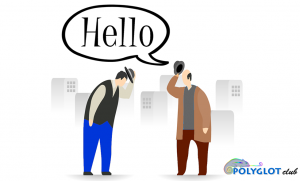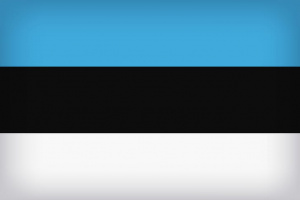Language/Standard-estonian/Vocabulary/How-to-Say-Hello-and-Greetings
< Language | Standard-estonian | Vocabulary
Jump to navigation
Jump to search
Rate this lesson:
🤗 Standard Estonian Greetings for Everyday Life
Hi Standard Estonian learners! 😃
Do you want to learn how to say “Hello” in Standard Estonian?
Greetings are an important part of any language because they allow you to connect and communicate with others.
If you’re planning a trip to the country or are trying to learn Standard Estonian, keep reading to discover some of the most important greetings.
Let’s get started! 🤗
Greetings[edit | edit source]
| English | Standard Estonian |
|---|---|
| general greeting | Tere |
| general greeting | Tervist |
| general daytime greeting | Tere päevast |
| morning greeting | Tere hommikust |
| evening greeting | Tere õhtust |
| informal morning greeting | Hommikust |
| informal morning greeting | Tere hommikut |
| informal morning greeting | Hommikut |
| informal morning greeting | Hommik |
| informal evening greeting | Õhtust |
| informal evening greeting | Õhtut |
| informal evening greeting | Tere õhtut |
| greeting spoken to a person who is working | Tere jõudu |
| greeting spoken to a person who is working | Jõudu |
| greeting spoken to a person who is working | Jõudu tööle |
| reply to Tere jõudu, Jõudu, and Jõudu tööle | Tarvis |
| reply to Tere jõudu, Jõudu, and Jõudu tööle | Jõudu tarvis |
| informal greeting | Terekest |
| informal greeting | Tšau |
| how are you? | Kuidas läheb? |
| how are you?, formal | Kuidas teil läheb? |
| how are you?, informal | Kuidas sul läheb? |
| how are you?, informal | Kuidas sinul läheb? |
| how are you?, informal | Kuidas sa elad? |
| how are you? | Kuidas käsi käib? |
| reply to Kuidas läheb, Kuidas teil läheb, Kuidas sul läheb, and Kuidas käsi käib | Hästi |
| reply to Kuidas läheb, Kuidas teil läheb, Kuidas sul läheb, and Kuidas käsi käib | Tänan hästi |
| reply to Kuidas läheb, Kuidas teil läheb, Kuidas sul läheb, and Kuidas käsi käib | Tänan küsimast, hästi |
| reply to Kuidas läheb, Kuidas teil läheb, and Kuidas sul läheb | Läheb |
| reply to Kuidas läheb, Kuidas teil läheb, and Kuidas sul läheb | Mul läheb hästi |
| reply to Kuidas läheb, Kuidas teil läheb, and Kuidas sul läheb | Mul läheb hästi, aitäh |
| reply to Kuidas läheb, Kuidas teil läheb, and Kuidas sul läheb | Minul läheb hästi |
| reply to Kuidas läheb, Kuidas teil läheb, and Kuidas sul läheb | Minul läheb hästi, aitäh |
| how are you? informal, "what's new?" | Mis uudist? |
| reply to Mis uudist | Mitte midagi |
| reply to Mis uudist | Mitte midagi erilist |
| reply to Mis uudist | Ei midagi erilist |
| reply to Mis uudist | Ei midagi |
| reply to Mis uudist | Ei midagi, tänan küsimast |
| welcome greeting | Tere tulemast |
| general greeting in the Saaremaa and Muhu dialect [ekk-isl] | Terit |
| general greeting in the Saaremaa and Muhu dialect [ekk-isl] | Terit teitele |
| general greeting in the Lääne dialect of Paimvere [ekk-wes] | Terbist |
| morning greeting in the Kesk dialects of Põltsamaa and Viru-Jaagupi [ekk-mid] | Tere ommikkust |
| morning greeting in the Kirde dialect of Prangli [ekk-nce] | Tere uomigut |
| morning greeting in the Kirde dialect of Viru-Nigula [ekk-nce] | Tere ommigust |
| morning greeting in the Kirde dialects of Lüganuse and Jõhvi [ekk-nce] | Tere ommikkust |
| morning greeting in the Ida dialect of Kodavere [ekk-eas] | Tere ommuguss |
| morning greeting in the Lääne dialect of Hanila [ekk-wes] | Tere omigust |
| morning greeting in the Lääne dialect of Häädemeeste [ekk-wes] | Tere omikust |
| morning greeting in the Lääne dialect of Martna [ekk-wes] | Tere omikkust |
| morning greeting in the Saaremaa and Muhu dialect [ekk-isl] | Tere omingust |
| morning greeting in the Saaremaa dialect of Mustjala [ekk-isl] | Tere ommikkust |
| morning greeting in the Saaremaa dialect of Anseküla [ekk-isl] | Tere omigust |
| morning greeting in the Saaremaa dialect of Kihelkonna [ekk-isl] | Tere oomigust |
| morning greeting in the Muhu dialect [ekk-isl] | Tere omingust |
| morning greeting in the Kihnu dialect [ekk-isl] | Tere omikkud |
| morning greeting in the Mulgi dialect of Karksi [ekk-mul] | Tere ommukust |
| morning greeting in the Mulgi dialect [ekk-mul] | Tere ommukut |
| morning greeting in the Mulgi dialect [ekk-mul] | Ommukust |
| morning greeting spoken in the Tartu dialect [ekk-tar] | Tere hommikut |
| general daytime greeting in the Kirde dialect of Kuusalu [ekk-nce] | Tere päivast |
| general daytime greeting in the Saaremaa and Muhu dialect [ekk-isl] | Tere päävast |
| midday greeting in the Lääne dialect of Häädemeeste [ekk-wes] | Tere lõunast |
| evening greeting in the Lääne dialects of Häädemeeste and Mihkli [ekk-wes] | Tere 'õhtast |
| evening greeting in the Kirde dialect of Lüganuse [ekk-nce] | Tere õhtast |
| evening greeting in the Saaremaa and Muhu dialect [ekk-isl] | Tere öhtast |
| evening greeting spoken in the Tartu dialect [ekk-tar] | Tere õdagut |
| how are you? in the Kesk dialect of Kose [ekk-mid] | Kudas so käsi käib? |
| how are you? in the Kesk dialect of Juuru [ekk-mid] | Kudas so käbäräd käiväd? |
| how are you? in the Kirde dialect of Vaivara [ekk-nce] | Kuida käsi käib? |
| how are you? in the Kirde dialect of Vaivara [ekk-nce] | Kuida käbäräd käiväd? |
| how are you? in the Kirde dialect of Jõhvi [ekk-nce] | Kuda käbäräd käiväd? |
| how are you? in the Kirde dialect of Kuusalu [ekk-nce] | Kuda käsi käib? |
| how are you? in the Kirde dialect of Kuusalu [ekk-nce] | Kudas käbäläd käüväd? |
| how are you? in the Ida dialect of Kodavere [ekk-eas] | Kuda käbäräd käevad? |
| reply to Kuda käbäräd käevad in the Ida dialect of Kodavere [ekk-eas] | Iass |
| how are you? in the Lääne dialect of Martna and Pärnu-Jaagupi [ekk-wes] | Kudas elad? |
| how are you? in the Lääne dialect of Martna [ekk-wes] | Kudas käsi keib? |
| reply to Kudas elad and Kudas käsi keib in the Lääne dialect of Martna [ekk-wes] | Hiaste |
| how are you? in the Lääne dialect of Pärnu-Jaagupi [ekk-wes] | Kudas käpp köib? |
| how are you? in the Lääne dialect of Pärnu-Jaagupi [ekk-wes] | Kudas käbäräd käivad? |
| how are you? in the Saaremaa and Muhu dialect [ekk-isl] | Kuda elu lähäb? |
| how are you? in the Saaremaa and Muhu dialect [ekk-isl] | Kuda lähäb? |
| how are you? in the Kihnu dialect [ekk-isl] | Kudas lähäb? |
| how are you? in the Saaremaa and Muhu dialect [ekk-isl] | Mis elu sa elad? |
| how are you? in the Saaremaa and Muhu dialect [ekk-isl] | Kuda elad? |
| how are you? in the Saaremaa dialect of Karja [ekk-isl] | Kudas käsi käib? |
| how are you? in the Saaremaa dialect of Kihelkonna [ekk-isl] | Kuidas käsi keib? |
| how are you? in the Saaremaa dialect of Kihelkonna [ekk-isl] | Kuidas käpad keivad? |
| how are you? in the Saaremaa dialect of Pöide [ekk-isl] | Kudas käbarad käivad? |
| how are you? in the Hiiumaa dialect of Käina [ekk-isl] | Kuidas käpad käivad? |
| how are you? in the Muhu dialect [ekk-isl] | Kuidas käbalad köevad? |
| how are you? in the Mulgi dialect [ekk-mul] | Kuda lääp? |
| how are you? in the Mulgi dialect [ekk-mul] | Kuda lääb? |
| how are you? in the Mulgi dialect [ekk-mul] | Kudas elu lääp? |
| how are you? in the Mulgi dialect of Kolga-Jaani [ekk-mul] | Kudas läks? |
| morning greeting in the Mulgi dialect of Tarvastu [ekk-mul] | Tere päävast |
| how are you? in the Mulgi dialect of Tarvastu [ekk-mul] | Kudas käsi käib? |
| how are you? in the Mulgi dialect of Helme [ekk-mul] | Kuiss käbäre käivä? |
| reply to Kuda lääp, Kuda lääb, Kudas käsi käib, Kuiss käbäre käivä in Mulgi dialect | Äste |
| how are you? spoken in the Tartu dialect [ekk-tar] | Kuda läheb? |
| how are you? spoken in the Tartu dialect of Tartu-Maarja [ekk-tar] | Kuda läks? |
| how are you? spoken in the Tartu dialect [ekk-tar] | Kuda käsi käib? |
| how are you? spoken in the Tartu dialect of Puhja [ekk-tar] | Kudas käsi käib? |
| how are you? spoken in the Tartu dialect of Nõo [ekk-tar] | Kudass käsi käib? |
| reply to Kuda läheb, Kuda käsi käib, and Kudass käsi käib in the Tartu dialect | Äste |
| general greeting used in the 18th century | Terre |
| general greeting used in the 18th century | Terre, terre |
| midday greeting used in the 18th century | Terre lounat |
| midday greeting used in the 18th century | Terre lounast |
| midday greeting used in the 18th century | Terre õhtust |
| how are you? used in the 18th century | Kuida kässi käib? |
| how are you? used in the 18th century | Kuida teie kässi käib? |
| welcome greeting used in the 18th century | Terre tullemast |
| welcome greeting used in the 18th century | Olle terwe tullemast |
| welcome greeting used in the 18th century | Olge terwe tullemast |
| general greeting used in the 16th century | Terre |
| general daytime greeting used in the 16th century | Terre pääwast |
| morning greeting used in the 16th century | Terre hommikost |
| morning greeting used in the 16th century | Terre hommiko |
| morning greeting used in the 16th century | Terre homiko |
| morning greeting used in the 16th century | Terre hommest |
| morning greeting used in the 16th century | Terre homikust |
| morning greeting used in the 16th century | Terre homikult |
| morning greeting used in the 16th century | Terre homselt |
| morning greeting used in the 16th century | Terre hommogult |
| midday greeting used in the 16th century | Terre lounast |
| midday greeting used in the 16th century | Terre lounat |
| evening greeting used in the 16th century | Terre öhtust |
| evening greeting used in the 16th century | Terre öddangult |
| how are you? used in the 16th century in the northern dialect | Kuida kässi käib? |
| how are you? used in the 16th century in the southern dialect | Kuis kässi käüp? |
| welcome greeting used in the 16th century | Terre tullemast |
| general greeting used in the 15th century | Terwe |
| daytime greeting used in the 15th century | Terwe pehwast |
| morning greeting used in the 15th century | Terwe hohmickust |
| evening greeting used in the 15th century | Terwe öchtust |
| general greeting used in the 12th century | Terveh |
| formal daytime greeting used in the 12th century | Terveh päevästä aigaa |
| formal morning greeting used in the 12th century | Terveh hoommikkosta aigaa |
| formal evening greeting used in the 12th century | Terveh õhtagosta aigaa |


